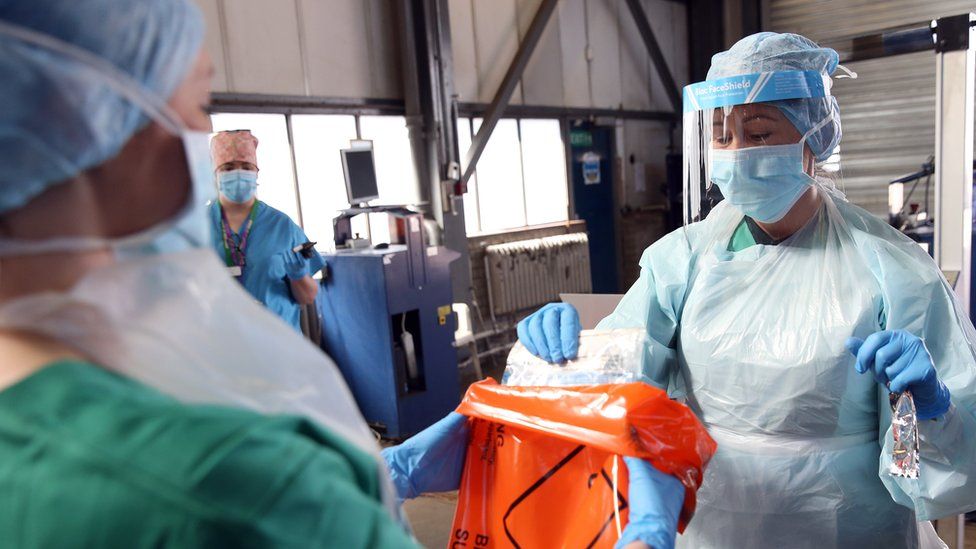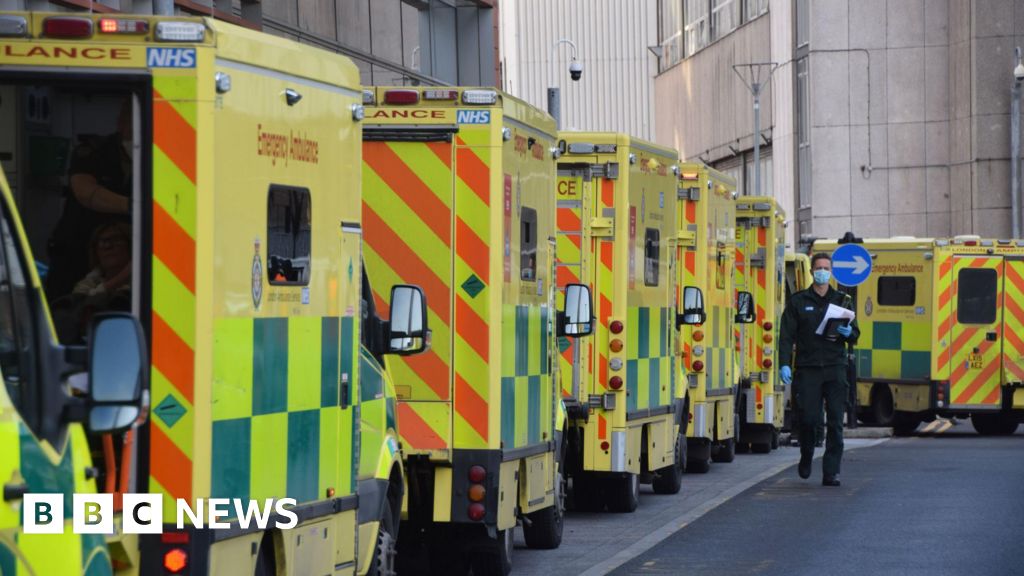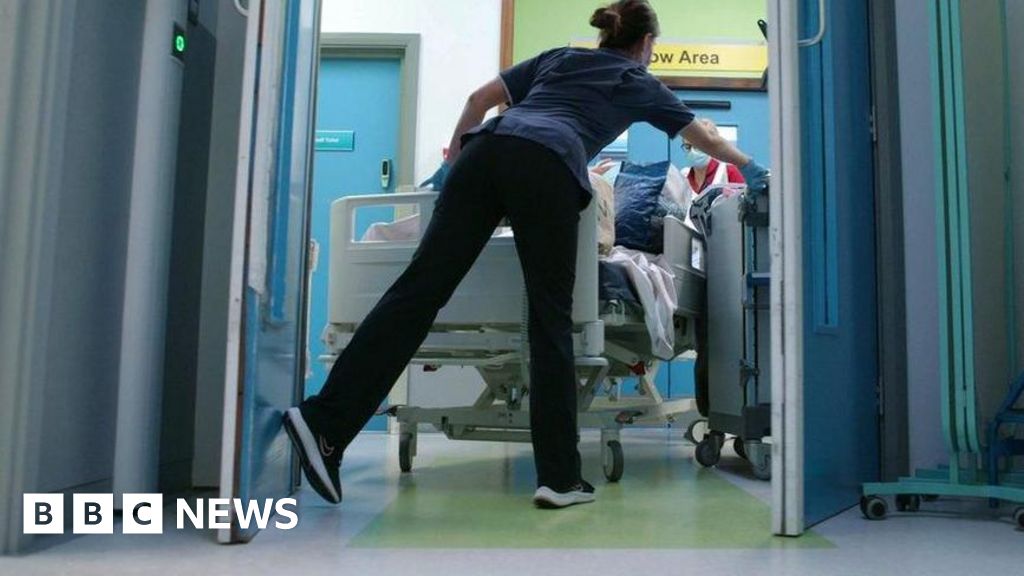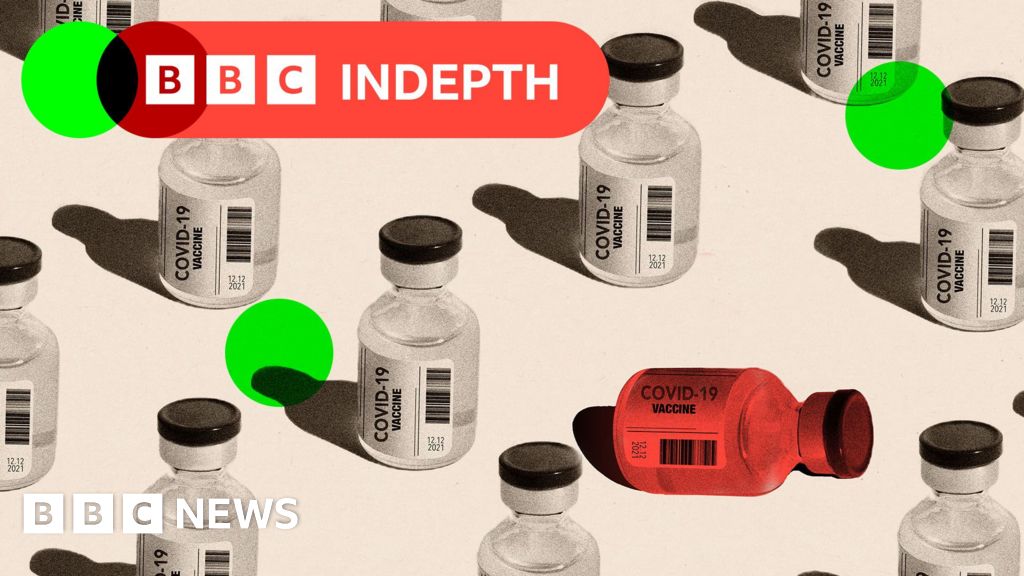ARTICLE AD BOX
 Image source, Pacemaker
Image source, Pacemaker
Why decisions were taken about what happened in Northern Ireland hospitals during the pandemic will be one of the things examined by the inquiry
By Marie-Louise Connolly
BBC News NI health correspondent
"Watching Covid patients say goodbye to their families via a Zoom call was difficult and extremely emotional."
Dr George Gardiner was an intensive care consultant at the Royal Victoria Hospital in Belfast and treated the most critically ill in the pandemic.
He says health staff who held a phone or iPad for patients and their loved ones witnessed "harrowing scenes" before a ventilator was turned off.
This week the UK Covid inquiry arrives in Northern Ireland.
Why decisions were taken about what happened in hospitals, care homes and how people were buried and who made those decisions will all be investigated.
Dr George Gardiner, seen here speaking to the BBC during the pandemic, said staff had witnessed "harrowing, tearful scenes"
UK Covid inquiry in Northern Ireland
On Tuesday, the UK Covid inquiry which is sitting in Belfast for three weeks will start hearing from the most senior politicians and health advisors in Northern Ireland about why decisions were taken and by whom.
This is module 2c of the inquiry, which is focussing on decision-making and political governance.
This module will investigate Northern Ireland specifically and will include the initial response, central government decision making, and political and civil service performance.
It will also probe whether Northern Ireland's political nuances had any affect on the effectiveness of the response.
There were tensions between the political parties when senior Sinn Féin figures attended the funeral of ex-IRA leader Bobby Storey and when the DUP's Edwin Poots, then minister for Agriculture, Environment and Rural Affairs, said coronavirus was more common in nationalist areas.
Who will appear at the Covid inquiry in Northern Ireland?
The hearings begin with opening statements and evidence from Covid-19 Bereaved Families and Disability Action.
Core participants who have been named in advance include the former first ministers, Dame Arlene Foster and Paul Givan, and Michelle O'Neill, who was deputy first minster during the pandemic.
Senior representatives from the departments of health, finance, the Executive Office, and the civil service will also be questioned.
Specific names and when they will appear are released weekly.
Other people appearing this week will be Eddie Lynch, the Commissioner for Older People, Sir David Sterling, former head of the Northern Ireland Civil Service, and Jayne Brady the current head of the NI Civil Service.
Image source, Pacemaker
Image caption,Former and current first ministers Arlene Foster and Michelle O'Neill will be core participants
Bereaved Families for Justice Northern Ireland
Brenda Doherty, whose mum Ruth Burke was the fourth person to die in Northern Ireland with Covid-19 is among those leading the local bereaved Families for Justice Group.
"Families were failed. We have always said this inquiry is about learning lessons so that nobody should go through again what we did. This is a living hell," she said.
"We had to meet my mum's coffin at the cemetery gates. We weren't allowed to touch it -we had to stand away from it and were told we could move closer once the coffin was in the hole."
Ms Doherty, who gave evidence at the Covid Inquiry in London, said she will judge the inquiry after it finishes its hearings in Northern Ireland.
"There is already a lot of confidence lost in politicians," she said.
"I think this is their time to show that they can be open and honest and take ownership of the mistakes that were made because there were mistakes.
Image source, Brenda Doherty
Image caption,Brenda Doherty's mother Ruth (left) was the fourth person in Northern Ireland to die after having contracted Covid
"I don't want to hear 'I can't recall', or 'I don't remember' because for me it shouldn't be a matter of recalling - if you were making decisions that were impacting people's lives there is bound to be paperwork somewhere and if you can't find the paper work well then something is not right."
Speaking to BBC News NI, Ms Doherty said the inquiry needs to help people cope with loss.
"We have all suffered loss - it is like somebody came and took them and for families who lost both parents it is like they have just vanished," she said.
"My sister says it is like somebody stole Mummy in the middle of the night because we didn't get to see her when she died or in the coffin."
Analysis: An important three weeks
The next three weeks will be important for Northern Ireland.
The UK Covid inquiry will be shining a light on the key decisions made by senior politicians and health officials.
In March 2020, the Northern Ireland Executive had once again been rebooted.
Relations between politicians and the state of the health and social care service were both fragile.
While Northern Ireland fared comparatively better than the rest of the UK in terms of Covid deaths (5060), those families who did lose loved ones want and deserve answers.
These hearings will scrutinise the political tensions that developed in the executive, certain headline events that caused political parties to publicly fall out and whether all of that impacted on how the public kept to the rules.
Who is leading the Covid inquiry and how does it work?
The Covid inquiry began on 28 June 2022 and is chaired by former judge Baroness Hallett who led the inquests into the 7 July London Bombings.
Image source, PA Media
Image caption,The inquiry is chaired by former judge Baroness Hallett
The inquiry has already had public hearings on resilience and preparedness; the current module 2c hearings are examining core UK decision-making and political governance.
Sitting in Belfast and focussing on what happened in Northern Ireland is significant as it means local politicians and health officials will be probed and the evidence they've provided to the inquiry, including WhatsApp messages and emails, will be questioned and shared publicly.
When will the inquiry publish conclusions?
Baroness Hallett said she intends to publish the report for the first area of work by early summer 2024.
The inquiry is not expected to conclude until sometime in 2026.
Public hearings for the third area of examination - the impact of the pandemic on healthcare systems across the UK - are expected to run for 10 weeks from autumn 2024.
How can the public get involved?
Anyone can share their experience through the inquiry's Every Story Matters project.
The Covid-19 Bereaved Families for Justice campaign group - which criticised the government's handling of the pandemic - has urged the inquiry to ensure these voices are heard.
Jennifer Currie says the circumstances surrounding her mother's death still haunt her
Jennifer Currie's mother June died in hospital in 2020 after contracting Covid while she was being treated for cellulitis.
The family say the circumstances around their mother's death "haunts them" as they were never informed that she was receiving end of life care.
While some of the family had a brief visit on the day she died, Jennifer said they would have insisted staying in the hospital even in the car park to be close by.
"When we went to leave, she said to us please don't leave me I am going to die and that will stay with us forever. Had we had known that my mum was in end of life care - we would never have walked out of that hospital," Jennifer said.
It is hoped the inquiry will listen and learn from those who have provided stories and who are providing evidence.
Dr Gardiner said he hoped that if there is another pandemic, lessons will be learned about how a twin track approach can operate within the health service where other patients with serious health conditions including cancer can continue with treatment.

 8 months ago
59
8 months ago
59








 English (US) ·
English (US) ·